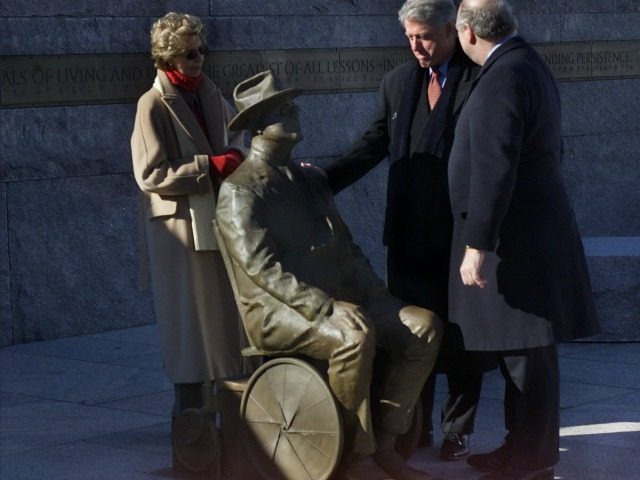If Democrats seeking the removal of historical memorials tied to racist history are serious, they should be tripping over one another to get in front of a camera and call for the removal of memorials and namesakes to Presidents Andrew Johnson, Woodrow Wilson, Franklin Delano Roosevelt, Lyndon Baines Johnson, and Sen. Robert C Byrd.
These five men had two things in common–all had a penchant for racism to one degree or another, and all were Democrats.
Some of the memorials to them are monuments, some are groves, others are highways, bridges, colleges, and even cemeteries. Of course, the cemeteries ought not be disturbed, but they should be renamed if the Democrats are serious about rooting out the vestiges of racism.
What follows is a short description of each of the Democrats and the memorials and/or namesakes in their honor:
President Andrew Johnson–Abraham Lincoln chose Andrew Johnson as his running mate in 1864 because Lincoln’s reelection hopes hinged on being able to attract some Democrat voters to his side. Lincoln was a Republican, Johnson a Democrat. The plan worked and Lincoln was reelected. However, following Lincoln’s assassination the oversight of post-Civil War policy for the South fell to Johnson, who believed the South ought to be able to make its own course. During his administration, post-Civil War Democrats enacted the Black Codes in the South, which were precursors to the Jim Crow laws they would implement in the 20th century. The Black Codes served to prevent freed slaves from actually experiencing the fullness of freedom. Johnson is honored with The Andrew Johnson National Historic Site and National Cemetery in Greenville, Tennessee.
President Woodrow Wilson–President Woodrow Wilson appeared tolerable of blacks and interested in their plight when running for election, but he made little effort to help better the condition of blacks as the 20th century hit its second decade. In fact, in The Warrior and the Priest, John Milton Cooper, Jr., wrote, “Wilson believed blacks were not innately inferior to whites and would, in two or three centuries, achieve a measure of economic and political, if not social, equality in America.” However, Cooper explained that these views had little impact on Wilson’s behavior as president of Princeton, a position he held prior to being President of the United States. At Princeton, Wilson “maintained the university’s long-standing ban on admitting blacks” and as President of the U.S. he “sanctioned” attempts to instill “segregation into federal departments.” Princeton honors Wilson with a college named The Woodrow Wilson School of Public and International Affairs.
President Franklin Delano Roosevelt–FDR ordered the internment of Japanese Americans during World War II. In other words, Japanese Americans were rounded up and held in captivity. History.com reports that FDR instituted internment by “[signing] the War Department’s blanket Executive Order 9066” in February 1942. FDR is honored with the Franklin Delano Roosevelt Memorial in Washington DC.
President Lyndon Baines Johnson—MSNBC put it bluntly, “Lyndon Johnson said the [n-word] a lot.” While “discussing civil rights legislation with men like Mississippi Democrat James Eastland, who committed most of his life to defending white supremacy, [LBJ’d] simply call it ‘the [n-word] bill.'” LBJ is honored with the Lyndon Baines Johnson Memorial Grove on the Potomac.
Sen. Robert C. Byrd–Prior to being a Democrat Senator in West Virginia, Byrd was a member of the Ku Klux Klan. When Byrd died in 2010, the Washington Post printed an eulogy which said, in part, “As a young man, Mr. Byrd was an ‘exalted cyclops’ of the Ku Klux Klan. Although he apologized numerous times for what he considered a youthful indiscretion, his early votes in Congress — notably a filibuster against the 1964 Civil Rights Act — reflected racially separatist views.” On June 26, 2010, the Cumberland Times-News reported that Byrd was honored by at least eight highways and/or bridges throughout West Virginia. The Times-News listed the memorials as “the Robert C. Byrd Expressway and Robert C. Byrd Bridge in Ohio County; Robert C. Byrd Highway (Corridor H); Robert C. Byrd Appalachian Highway System (also Corridor H); Robert C. Byrd Appalachian Highway System (Corridor G/U.S. 119); Robert C. Byrd Bridge in Huntington; Robert C. Byrd Interchange at Birch River; [and the] Robert C. Byrd Appalachian Highway System (Corridor L/I-77).”
If Democrats are serious about weeding out monuments tied to racist history, the 12 monuments which honor the above mentioned Democrats ought to be first on the list.
AWR Hawkins is the Second Amendment columnist for Breitbart News and host of Bullets with AWR Hawkins, a Breitbart News podcast. He is also the political analyst for Armed American Radio. Follow him on Twitter: @AWRHawkins. Reach him directly at awrhawkins@breitbart.com

COMMENTS
Please let us know if you're having issues with commenting.